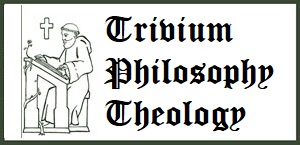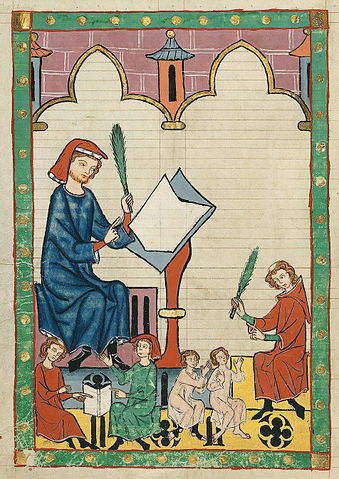

Trivium-Philosophy-Theology Primer: As a preparation for the study of formal logic, this class introduces the basic vocabulary of logic and the basic skills involved in recognizing and understanding logical terms, and statements. In addition, first steps are taken in the practices of using terms clearly, formulating judgments truthfully, and even constructing simple arguments validly. The knowledge and skills gained will make the transition into Trivium Studies 1: Traditional Logic easy and smooth.
- Teacher: Bernadette Shields
- Teacher: Anthony Tibbetts

Trivium-Philosophy-Theology 1: Formal Logic This class emphasizes the structure of logical reasoning, the form that right reasoning takes. It begins with an Aristotelian account of the three acts of the intellect: simple apprehension, judgment, and reasoning. These acts are verbalized as terms, propositions, and syllogisms, respectively. With this background, the students learn the four types of logical proposition, the square of opposition for understanding the ways in which those propositions are related, and the rules for combining propositions into syllogisms without error. The course concludes with the consideration of various complex forms of the syllogism and numerous case studies of famous arguments. The second half of the year emphasizes the practice of "translating" and analyzing "ordinary language arguments."
- Teacher: Bernadette Shields
- Teacher: Matthew Walsh

Trivium-Philosophy-Theology 2: Advanced Logic & Rhetoric The student who has been learning advanced grammar and syntax in the Latin cycle, and who has taken Logic will find a completion to our introduction to the mediaeval trivium in this class. First, we cover material logic; that is, we look at how to think about the content, rather than the form of logical reasoning. Then, drawing upon Aristotle's Rhetoric and other Greek and Roman works, we continue the exploration of what language and thought are, now focusing upon thought as expressed to others with the goal in mind of bringing other minds to truth.
Rhetoric the "modes of persuasion," beginning with logos already studies in logic class and then moving on to how we are motivated by what is attractive to our emotions (pathos) and noble to our wills (ethos). This necessitates an introduction to the philosophy of human nature in order to understand the faculties of reason, will, appetite, and sensation. In addition, the course offers a defense of rhetoric reliant upon beauty and lays out a practical imitative approach to composition, using the five canons.
- Teacher: Zach Krueger
- Teacher: Bernadette Shields

Trivium-Philosophy-Theology 3: Intro to Philosophy - Nature, Man, & Science Having considered the universal tool of all science and art in logic and gained experience in the use of language to express what we know in rhetoric, we are now ready to consider the many things to which we can apply these skills. We begin by asking "What is science?" and "What are its divisions?" The answers to these questions set up a discussion of the question: "What does it mean to be wise?" In answer this, we explore the unified vision of ascendant education that stands behind the scholastic liberal arts and lay out a road map to guide the student as he transitions from the tools of learning to the sciences (natural, quantitative, and divine) that are the content of learning.
The course continues by digging down into the consideration of what would traditionally be called "natural science" and in more recent times the "philosophy of nature." Questions like "What is a nature?" "What is a living thing?" and "What is the purpose or point of the existence of each thing?" are considered. The course next narrows the focus to man: his nature, abilities, limits, freedom, and responsibilities--we will seek to define human nature and catalog its powers. Consideration will be given to the practices that set man apart from other animals, the unique inner life of man, and the deep dignity of the human soul. This consideration directs the students to the natural follow-up question "What is the point of human life?"
- Teacher: Anna MacKinnon
- Teacher: Bernadette Shields

Trivium-Philosophy-Theology 4: Natural Theology & Law. This course, following the division between natural and revealed theology covered in TPT 3, considers being as such and the divine by means of the natural abilities that man possesses. We will consider the basic principles of metaphysics, the nature and knowability of God; God's attributes; and God's Law and its knowability; the basis for natural law. The overarching goal is to look closely at what we can know, reasonably contend, or suspect in mystery about the Divine, basing our activity upon those gifts that we possess, naturally, as humans. We will make use of the writings of some of St. Thomas' contemporary interpreters as well as those of St. Thomas himself.
This course is intended as our second philosophy course and our introductory systematic theology course because it focuses upon what is best known to man by nature as a preparation for understanding the more profound truths that God teaches us in Divine Revelation. It prepares the student to more fully grasp and appreciate the implications of the Gospel of Christ.
- Teacher: Joshua Keatley
- Teacher: Bernadette Shields

Trivium-Philosophy-Theology 5: Revealed Theology. This course considers the divine by means of the truths revealed by God, unknowable by man through his natural abilities alone. The course opens with a consideration of the basic concepts of revelation and faith, the interplay of faith and reason, and the means of revelation. It then explores the fundamental aspects of Christ's revelation. Seeking to clarify what is revealed and how it affects our understanding of what man is. The methods of understanding revelation are explored (exegesis, mysticism, the development of doctrine, etc.), as well as the means of living in revelation (prayer, liturgy, sacraments). Each of the main sources of knowledge in faith: scripture, the Fathers, the teachings of the Church, and the work of theologians will be discussed. The most basic questions of the class are "What has God revealed?" and "What does this mean for us?"
This is intended as our second high school course in systematic theology because it focuses upon how revelation builds upon what we know of God by natural means and develops the students understanding of the means of revelation, as well as some of the essential truths of the Christian Faith. The course stands as the crowning glory of the TPT sequence in which the mind is invited to consider glories that exceed his ability to know by nature. Here is the revelation of the gift for which man is made.
- Teacher: Zach Krueger
- Teacher: Bernadette Shields

- Course creator: Kenneth Rolling